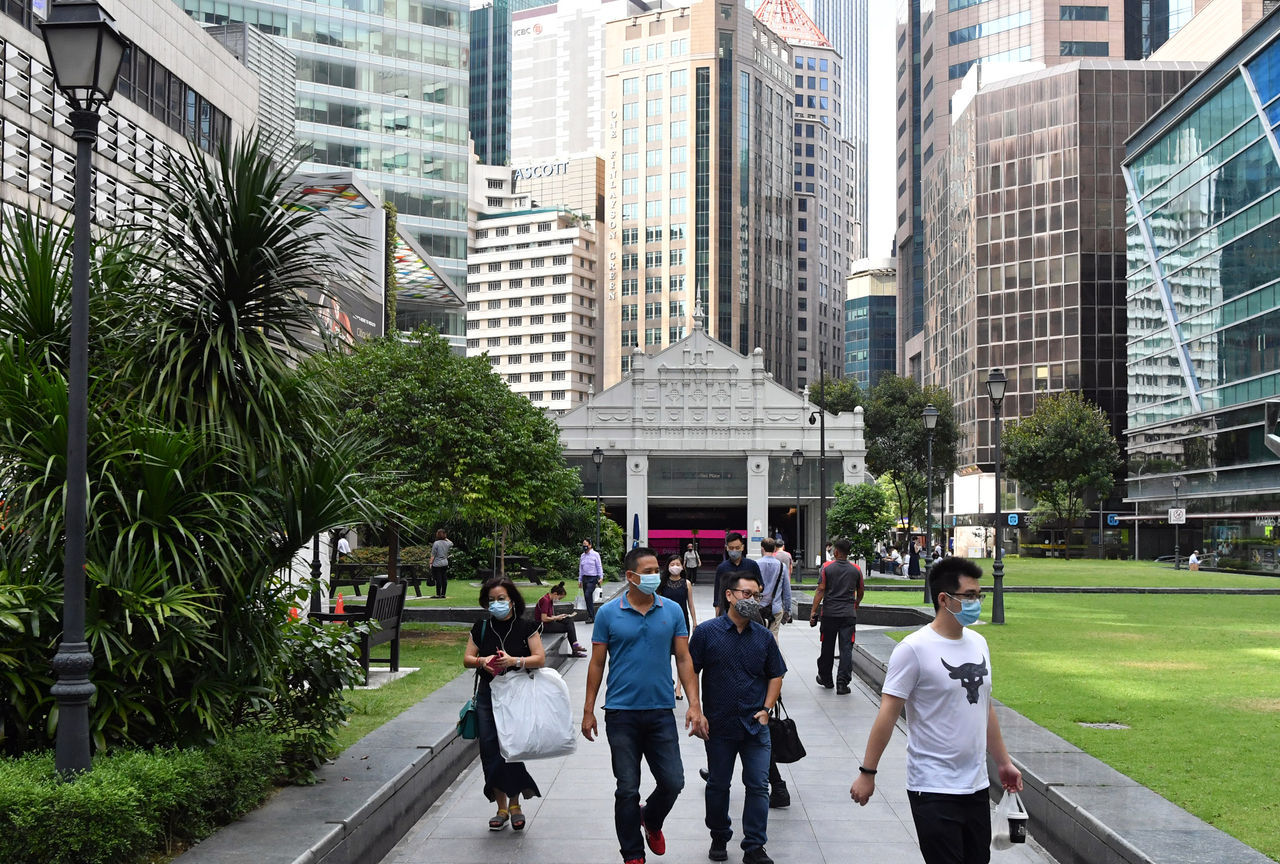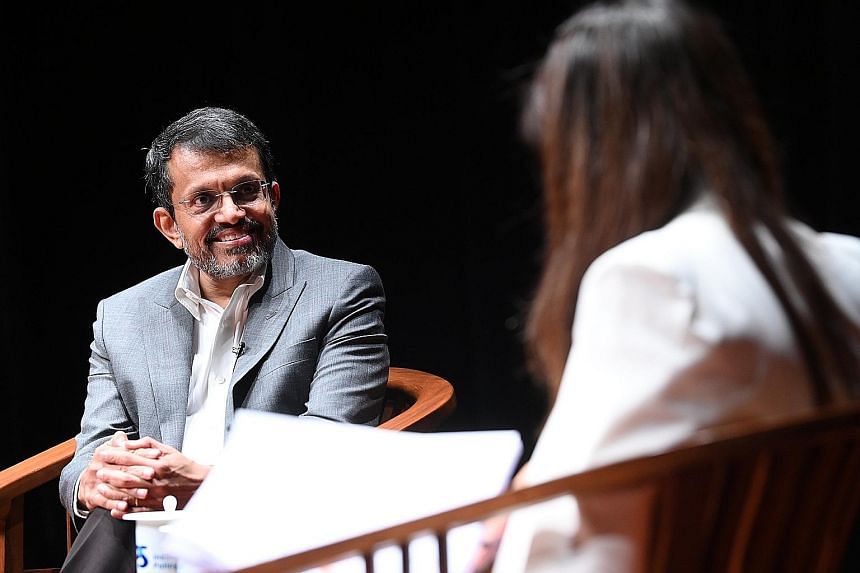Broaden and enhance meritocracy to give S'poreans hope and opportunity: MAS chief Ravi Menon
Sign up now: Get ST's newsletters delivered to your inbox

There is still too much emphasis during recruitment on educational qualifications and interviews in some firms.
ST PHOTO: CHONG JUN LIANG
SINGAPORE - While Singapore's meritocracy has worked well so far, the risk of it becoming increasingly narrow and rigid is real.
It needs to be refined and enhanced to offer Singaporeans hope and opportunity, Singapore's central bank chief said on Wednesday (July 28).
Monetary Authority of Singapore managing director Ravi Menon was speaking on the topic An Inspiring Nation at the Institute of Policy Studies (IPS) at the Lee Kuan Yew School of Public Policy.
It was the last of four lectures he is giving in his capacity as IPS' ninth S R Nathan Fellow. The fellowship advances research on public policy and governance.
Mr Menon said that while there is no better alternative to democracy, meritocracy and the market, they can lead to excesses that are socially harmful if they are left completely unfettered.
What is needed, he said, is to continually refine, temper and even constrain them to harness their benefits, while minimising their excesses.
He cited three ways to achieve a more enlightened meritocracy: broadening it to recognise a more diverse set of human talents and skills; making it inclusive to blunt some of its sharp edges; and exercising compassion, recognising the roles society and fortune play in an individual's success.
While schools have moved towards full subject-based banding, meritocracy must go beyond schools to the workplace, he said.
"It is little point to have a school system that recognises different areas of strength but the workplace does not reward them equitably."
He noted that in many businesses here, there is still too much emphasis during recruitment on educational qualifications and interviews. These tend to favour particular skill sets and attributes over others, and may not be what the employer really wants.
"I have been told quite often that a six-month internship on the job tells far more about a candidate's suitability and likelihood to do well than analysing resumes and conducting interviews," he said.
"Internships also give those who may have missed getting top grades the opportunity to demonstrate on the job their capabilities and strengths."
Five values-based attributes
He described five values-based attributes that could make the Republic an inspiring nation to Singaporeans as well as others: A meritocracy of hope, a beacon for diversity, a city of giving, a heart for the environment, and what he called "a thousand points of light".
On diversity, he said Singapore is seeing greater diversity across multiple fronts - nationality, ethnicity, cultural values, political views and belief systems, and diversity that is not managed well has fractured societies.
"It comes down to values rather than policies: values like keeping an open mind; developing empathy; and being gracious," he said.

He added that the reason behind many disagreements is that lived reality is not in accord with statistical facts.
For example, while Singaporeans frequently express concerns about job security or discriminatory hiring, during the first quarter of this year, net jobs for locals increased by 24,000 and there were 68,000 vacancies remaining at the end of the quarter.
But for those who have lost jobs or know of friends who have lost jobs or seen a less-qualified foreigner being employed in place of a local, that is their lived reality which is at variance from the statistical facts, and this is where empathy comes in, he said.
He said: "We should not reject statistical facts just because our own lived reality is at variance with them; nor should we trivialise anyone's lived reality as a mere exception to statistical facts - because the pain for him or her is real.
"There is some discriminatory hiring; let us stamp it out. There have been fake certificates presented by some employment pass holders; let us send them back. But let us not overgeneralise. Let us also acknowledge that many foreigners who come here to work are highly qualified, passionate about their work and decent people.
"They work hard, keep late nights, deliver good products and services, and contribute to our society."
A city of giving
In his lecture, Mr Menon posed this question: Can Singapore be a city of giving, a nation of volunteerism and philanthropy, serving its own community and Asia?
There have been many inspiring human stories of giving amid the Covid-19 pandemic - small but priceless acts of kindness, he said.
As one of the largest offshore wealth management centres in the world, Singapore can serve as a hub for philanthropic giving, he added.
Noting that Singapore has more than 400 single family offices, of which an estimated 70 per cent are engaged in philanthropy, he said being a philanthropy hub will encourage the development of related advisory capabilities and good jobs for Singaporeans.
Such offices are set up by a family to manage their wealth and oversee other things such as philanthropic activities and business operations.
"There is growing interest in philanthropy and environmental sustainability among the rich of Asia. We can combine charitable minds, deployable capital, and our trust premium to serve as a credible and impactful base for philanthropists to do good work in the region out of Singapore."
Innovative methods can be applied to enhance philanthropy, too.
For example, donors have moved away from direct giving to exploring the use of innovative structures to deliver the greatest impact sustainably, such as through donor-advised funds and contributing through third-party foundations.
There are also venture philanthropists who adopt a venture capital model, playing an active role in guiding the future of the beneficiaries, providing early-stage financing and mentoring their leaders, he added.
A thousand points of light
Mr Menon quoted what the late United States president George H.W. Bush said at his inaugural address: "I have spoken of a thousand points of light, of all the community organisations that are spread like stars throughout the nation, doing good."
Singapore, too, must have a thousand points of light. It must be a democracy of deeds, not just words, he said.
Singaporeans, he added, depend too much on the Government to solve their problems. "Good government is Singapore's greatest strength, it is also our greatest vulnerability, for it is a single point of failure.
"With all the complexities and challenges ahead, Singapore needs a much stronger ecosystem, multiple sources of strength: A more active citizenry that self-organises; a strong business community that takes the lead in innovation and ideas to grow the economy; an energetic civil society that champions change for the betterment of the country; a vibrant academic community that provides rigorous independent analysis and insights; a high-quality media that informs and promotes public discourse based on fact and reason; a purposeful and professional philanthropic community that makes impact on the ground; and so on, making up a thousand points of light, brightening and energising our nation."
While there are growing fractures in many societies, he expressed optimism that Singapore has the makings of "a thousand points of light".
In the interim, the Government is trying to be less directive and more collaborative, and there could be more public debate and messiness, he said.
"We need to be able to handle this. Messiness and uncertainty are par for the course in the world of innovation... It is the sign of a maturing society and the basis for a more durable nation."
But the Government alone cannot create an innovative economy or inclusive society.
During the question-and-answer session moderated by DBS Bank institutional banking group head Tan Su Shan, he said a social compact should also form among the people, so that the Government is simply one of several players.
"That must be a collective, national endeavour. Private sector partners, employers and enterprises, the labour movement, community groups and individuals must do our part, and work closer to promote innovation and more equitable outcomes."
And the way to cultivate desired values in society is through practice, he added.
Citing the Greek philosopher Aristotle, he said: "We become just by doing just acts, temperate by doing temperate acts, brave by doing brave acts. If pockets of people start doing that and get noticed, then it takes shape."


